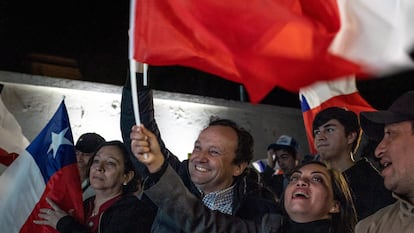Chile’s far-right becomes main political force following Constitutional Council elections
José Antonio Kast’s Republican Party will have the final say on a new Constitution after securing a rightist majority on the 50-seat body. Gabriel Boric’s left did not achieve enough support to gain power of veto

The far-right Republican Party (PLR) scored a resounding triumph at the polls held in Chile on Sunday to elect the 50 members of the Constitutional Council, who will be tasked with drafting a new political charter for the country after the rejection last September of a prosed new Constitution put forward by the leftist government of Gabriel Boric.
The PLR, led by former presidential candidate José Antonio Kast, who won the first round of the 2021 election before being defeated by Boric, maintains the stance that the current Constitution, enshrined in 1980 during the dictatorship of Augusto Pinochet, remains valid and does not need to be altered. A new text will be submitted to the Chilean votership in December.
The Republican Party garnered 35% of the votes in Sunday ballot, winning 22 seats on the council. Boric’s coalition was second with 28%, gaining 17 of the 50 councilors, which will leave it without the power of veto, for which it required 21 seats. The far right was locked in an internal battle with the traditional conservative factions and came out on top, with the other rightist bloc made up of the Independent Democratic Union (UDI), National Renewal (RN) and Political Evolution (Evópoli), gaining 21% of the vote and 11 council members.
“If these forecasts, paradoxes of history, are fulfilled, those who have for decades refused to consider the possibility of a constitutional change and who today represent the main threat to democracy, will have an open field to write the new text without any major obstacles,” noted Pierina Ferretti, executive director of the Nodo XXI Foundation, which is linked to Boric’s Frente Amplio, before Sunday’s results were confirmed.
After the count had been completed, Kast delivered an address his party’s headquarters. “Today is the first day of a better future for our country. Chile has defeated a failed government,” he said to cheers from supporters. Boric also addressed the nation, acknowledging that “the failure” of the first attempt to make changes to the Constitution — which was rejected by 62% of voters — was due in part to not listening to the opinions of those who thought differently. “I want to invite the Republican Party not to make the same mistake we made,” the president added.
The two right-wing blocs in Chile, the extreme right and the traditional conservatives, led by a new generation who remain committed to a new Constitution, exceeded expectations in Sunday’s vote. Combined, the political right has 33 seats on the Constitutional Council, surpassing even the most optimistic analytical projections of recent weeks. With this majority — over three-fifths of the council — the right can propose, approve, and modify constitutional norms.
The three traditional opposition parties, however, find themselves between a rock and a hard place: the temptation to toughen their positions in line with the PLR of Kast, a former UDI member, or maintaining their tactical distance to negotiate with the other factions on the Constitutional Council. “The big question is whether the leadership of the conventional right is going to withstand the tsunami. The temptation to follow Kast and company will be strong,” academic Cristóbal Rovira, an expert on the ultra-right, tells EL PAÍS. “All the actors [from the Communists to the Republicans] have discussed public security day and night, it is the main theme of the ultra-right. It is the same as in Europe: if everyone is talking about immigration, the one who wins the battle is the one who opposes immigration.”
At least two other milestones of significance were set in Sunday’s ballot: the extinction of the center-left grouped in the Todo por Chile bloc (the Party for Democracy, led by former president Ricardo Lagos and the current Minister of the Interior, Carolina Tohá, the Radical Party and the Christian Democratic Party — the only one of the three that does not form part of Boric’s government).
The Todo por Chile coalition garnered just 9% of votes, leaving it without a representative on the council. It is a serious blow for the moderate sector that once shaped the Concertación governments (1990-2010) and which gambled on distancing itself from Boric’s Frente Amplio and the rest of the left by running on its own.
Meanwhile, the Party of the People (PDG), the populist force led by economist Franco Parisi, came in last place despite forecasts that it would win some seats on the council. The PDG gained just 5.4% of the vote.
Sunday’s results in Chile have set up a great paradox for the country’s political future: when 15 million Chileans go back to the polls to either approve or reject the proposed new Constitution in December, they will be presented with a choice between the one drawn up by Kast’s far-right or the 1980 text approved during the Pinochet dictatorship.
Sign up for our weekly newsletter to get more English-language news coverage from EL PAÍS USA Edition
Tu suscripción se está usando en otro dispositivo
¿Quieres añadir otro usuario a tu suscripción?
Si continúas leyendo en este dispositivo, no se podrá leer en el otro.
FlechaTu suscripción se está usando en otro dispositivo y solo puedes acceder a EL PAÍS desde un dispositivo a la vez.
Si quieres compartir tu cuenta, cambia tu suscripción a la modalidad Premium, así podrás añadir otro usuario. Cada uno accederá con su propia cuenta de email, lo que os permitirá personalizar vuestra experiencia en EL PAÍS.
¿Tienes una suscripción de empresa? Accede aquí para contratar más cuentas.
En el caso de no saber quién está usando tu cuenta, te recomendamos cambiar tu contraseña aquí.
Si decides continuar compartiendo tu cuenta, este mensaje se mostrará en tu dispositivo y en el de la otra persona que está usando tu cuenta de forma indefinida, afectando a tu experiencia de lectura. Puedes consultar aquí los términos y condiciones de la suscripción digital.









































